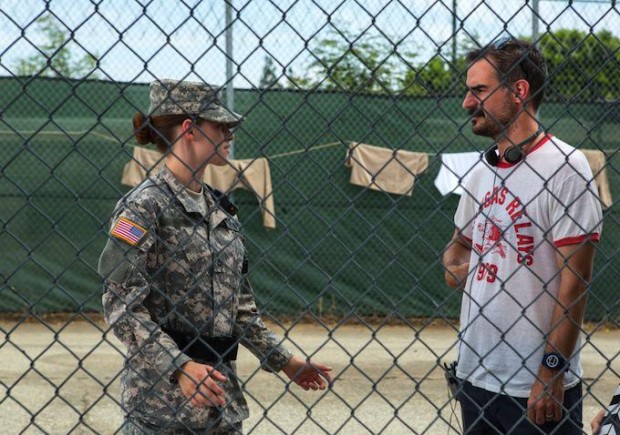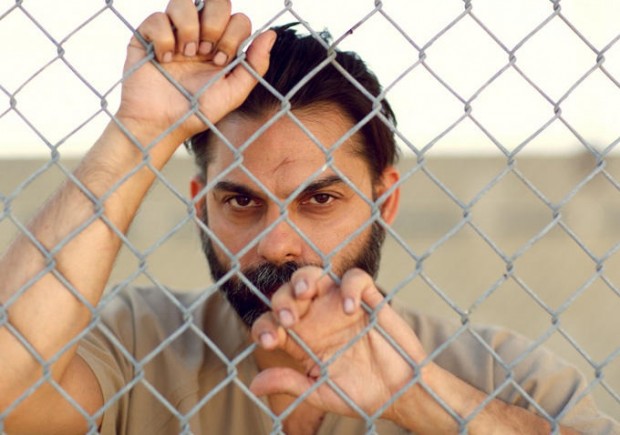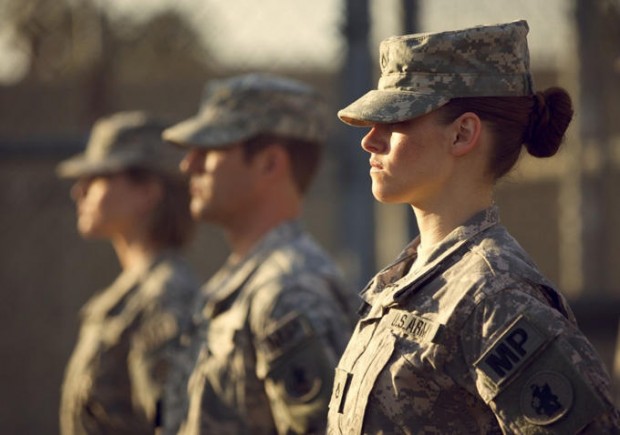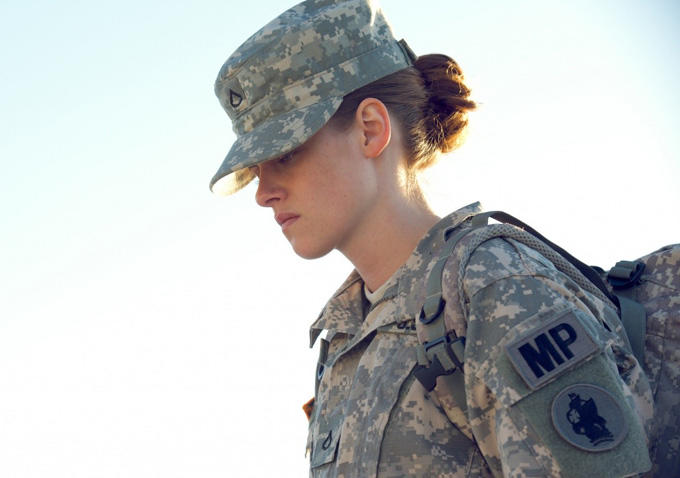
After doing odd jobs in various arena of the film industry, from a crew member on David Gordon Green‘s early features to graphic designer on Star Trek, Peter Sattler finally premiered his directorial debut at Sundance Film Festival this year. Set in Guantanamo Bay, Camp X-Ray follows the relationship between Private Amy Cole (Kristen Stewart) and a GITMO detainee named Ali (Peyman Moaadi) as we said it’s “a war movie that’s about individuals rather than ideals.”
I recently had the chance to speak with the director to discuss those early filmmaking days and what he learned, as well as what kind of experience he brought to his debut. We also discussed the legitimacy the project got when Stewart came on board, how she helped cast Moaadi, his time at Sundance, finding a narrative balance, if he’s sick of watching the film, what’s next, and much more. Check out the conversation below and we’ve also included a recent 40-minute conversation with Sattler and Stewart about the film.
I saw some of your first credits were working with David Gordon Green, who executive produced this film. Can you talk about that relationship?
Yeah, absolutely. David is a great friend and a long-time buddy. We went to film school together in North Carolina and we became friends there. He was a few years ahead. When he started doing his first features he basically would reach out to all of his friends from film school. I remember I got a call from him saying, “I’m making a movie. I want you to come work on it.” I was like, “Cool, what would you like me to do?” He was like, “I think you’re going to be the on-set dresser.” I was like, “I don’t know the first thing about being an on-set dresser.” He’s like, “No no, we’ll figure it. Just come down. I just want to surround myself with cool people.”
And he did and I’ve known him ever since, after having worked as a dolly grip, PA, all these things, and in the meantime just constantly working on writing and trying to get movies set up out in LA. Eventually I adapted a comic book for him for somebody and then it didn’t get made, then doing writer-for-hire-type stuff and studio rewrites, which is great since it pays the bills and it’s great exercise. Going through that I’ve always had this desire and this drive to make that first feature and I think part of the challenge of that was finding an idea I wasn’t just passionate about, but that was important and that was different, that could really grab an audience, but I could still make for nothing. When I finally keyed into the idea of doing this small two-hander inside of Gitmo, I was like, “This is the one. This is the film I’ve been waiting for my whole life.” So I instantly threw myself wholeheartedly into that. David, of course, is also an executive producer on the film and was really influential in championing me and getting the movie off the ground.
You’ve mentioned you’ve done a million things on set. Do you think that’s imperative for a first-time director? I’m sure it was a daunting task, but did you feel a little more equipped?
Actually, I felt perfectly equipped. There’s people who say that, they’re nervous on their first day on set, but I wasn’t. I’ve been around sets ever since I left college and even in film school as well. Having done all these jobs I think it was very helpful because as a director you’re directing the actors, but essential you’re directing the whole she-bang. The best directors are able to utilize every asset you have and maximize the efficiency of these things to reap the greatest creative awards. So if we’re sitting there trying to set up a shot, I knew enough about what a gaffer and a grip and our focus puller and our electrician was doing to be able to find easy ways to create efficiencies because on a film this small you’ve got to move like the wind. You can’t mess around and say, “Yeah. I want this over here.” If I said, “I want this to look this way,” I knew what that was going to cost in time.
I could easily decide that that doesn’t matter and this does. Don’t bother with that because I knew it was going to take you two hours to rig. I can shoot around that, it doesn’t matter. Spend your time here instead. Also, just like you said, it creates a general comfort level because you show up on set and you know how these things run. It’s also nice because as writers you observe. So I could observe all these other directors. Especially watching the way David worked was really essential. Also, I think, as I talked about David’s early films, surrounding yourself with people that are there for the right reasons. Not just a dated grip who is just waiting to clock out and go home, but people who have a passion for what you’re doing and can create this very friendly atmosphere, everyone pulling in the right direction. When that happens, it depends on the set, but it’s very magical. It doesn’t just affect the comfort of shooting, it affects the performances because the actors feel that so it does end up on screen.
Getting to the casting, Peyman Moaadi is such a fantastic actor in Asghar Farhadi’s film. Were you privy to A Separation and About Elly before?
I hadn’t seen either of them until our casting director suggested Peyman. I watched A Separation and I was blown away. I’ve just become obsessed with Asghar Farhadi’s work. He’s so good. Peyman is so amazing in that role. It’s actually funny because when I saw A Separation, he’s so stern and so buttoned-down and so taciturn in that film, I thought this is completely wrong. Ali needs to be loud and boisterous. Kristen’s character is the one that’s quiet and buttoned-down, but my casting director said, “Just call him. Do a video chat with him. You’ve got to meet this guy.” So I did a video chat with him in Iran and he instantly jumped on and was like, “Hey sir! How are you doing?” He’s so full of life. It spoke to his range as an actor that he could play a character so different from his own persona. Honestly, after that first call I had with him, I couldn’t get Peyman out of my mind and then when I put Peyman and Kristen on a video chat together the chemistry was instant. We were just talking with him and Kristen had since watched A Separation and we talked about him. During the video chat we were talking with him and then at the end, I remember Kristen and I just looked at eachother and she was like, “We have to give him the role.” I was like, “Yeah. We do.” We gave him the job right on the spot. We were like, “Peyman, no one else can play this role.”
Yeah, he’s great. When Kristen came on board is that what got more financing in place or was it there beforehand?
There was some in place, but I’m not even sure that would’ve been enough to get the movie going. You know, having Kristen on board helps in a lot of different ways. Not just in terms of financing, but really in terms of how people take the film seriously. If you sent a script out to an actor like Peyman Moaadi and there’s nobody in it and you’ve never heard of the director, no one is really going to take it seriously. No one is going to return your phone calls. Similarly, we were so lucky to get someone like John Carroll Lynch in this film. Just having an actor with the gravity and weight that Kristen does, it’s a vote of confidence. When you’re a first-time director, you need someone to say, “Hey, I believe in this guy and you should too.” David Gordon Green did that as an EP and Kristen when we met and said we want to do this movie together, she gave that vote of confidence as well. Even if they love the script, they’re just like who is this guy? I hope he’s not an asshole.
The film definitely has political elements to it, but I don’t think that’s really its main thrust, rather showing this relationship between two people. How did you carefully strike that balance?
It’s a real tightrope you have to walk there. I think the way that we approached it, the general mantra we had, was just to be honest, to shine a stark light on things that we saw as true and poignant without trying to make any judgement about it. We were conscious to make the film try not to manipulate the audience. I repeated that to everyone in every situation. I remember when we were working on the music with Jess [Stroup], our composer, I was like, “That cue feels like we’re manipulating too much. It feels a little too like we’re trying to make you sad about that.” So that kind of worked throughout the film as a way to be observational and austere and present an unvarnished look at the film. That goes into the cinematography. I didn’t want to do a bunch of flashy director tricks. I just wanted to, as much as possible, have it unfold in a very real, realistic manner. The second you start getting into politics you just go down a rabbit hole then half your audience is going to stop listening because you’re not saying what they want to hear. For me it was more important to try and avoid those pitfalls and instead focus on a more human story, and along the way show people a few things about Guantanamo Bay and don’t give them the answer, but at least have themselves ask the question again.

Can you discuss your experience at Sundance and acquisition, perhaps what you felt going in?
Yes, Sundance was a whirlwind, as anyone that’s been there knows. It’s a circus, man. It’s crazy. That was the first time I’d been to Sundance, ever, attending or with a film or anything. So to go there with Kristen and all the media hoopla surrounding her and all the press we were doing, it was wild. At the same time it was very interesting to me because we literally just finished the film. I did a quality check on the DCP like two weeks before Sundance happened so it still so raw and still just a part of me. It was a very weird emotional time. There’s also kind of a release. Once it’s done and you get it out there and you start to talk to people that have seen it and you read a review or talk to someone and they understand exactly what you were trying to do, it’s a really satisfying thing. It’s like, “Oh, thank God.” I had a very clear vision of what I wanted the movie to be then it just becomes a question of the execution and when you execute that, do people get it? A ton of people have and that’s just super satisfying to me.
So yeah, I was there and IFC picked it up and they’ve been awesome. We’ve got a nice little release coming out here and we did a ton of crazy press with Kristen and we’re doing a bunch right now with her. It’s been nice and it’s a real challenge too. It’s a film about Guantanamo Bay. That’s an interesting marketing challenge. How do you get people to look at something they’ve spent the last 12 years of their life ignoring? Which is part of the approach I wanted to take. Not to be this over-the-top political film but make it about people. Whether or not you share my opinions about Gitmo, or whatever your opinion about Gitmo is, you can relate to people. You can relate to any human being if you get to know them well enough. That’s really the whole point of the film.
Some filmmakers when they premiere their movie they wash their hands and don’t ever want to see it again. Have you been watching it?
I’ve seen it numerous times but I don’t like watching it any more, not because I don’t like it. I really love the film. It sounds weird, but I think sometimes that’s a hard thing for an artist to say because you have to be critical of your own work but you have to believe in it. It’s a weird split mind. The real problem with making a movie, especially making one as fast as we did, is that it’s so easy to loose objectivity. I’ve seen the movie a million times so what I want is to not watch it for a year and then watch it again and have that experience the first time I had that idea. It’s hard. When you’re behind the curtain like that you don’t get that clean and clear vision like an audience does. Also our editing was so intense. I was in the room every day every hour with Geraud [Brisson], my editor so I saw it all a billion times. So actually I’ve been saving up since I haven’t watched it in awhile. I think the next one I’m going to watch is going to be in Abu Dhabi. We’re going to the Abu Dhabi Film Festival and I’m really excited to see how the film plays to a Middle Eastern audience. That’s a really unique viewing experience that I’m quite looking forward to.
In terms of what’s coming up next, is all your focus now promoting this or have you started developing other projects?
I’ve been writing away which is a nice way to not purge Camp X-Ray, but these things are so intense there’s a point where you have to let go and it’s helpful to have something else to throw yourself into. Right after Sundance, two or three weeks later, I had this idea that I had been holding on to for maybe 20 years. I was like, maybe now is the time. I think I can pull this one off now. So I sat down and I started writing. I’ve been hammering away on that. The cycle of films are so interesting. You go do this movie and then you get to walk away from it and focus on this other thing and now it finally comes out and you get to revisit all those old feelings and thoughts and memories. It’s nice because now I have some perspective and distance on it. I can look at it in a different way because I’ve had time to think about it.

Camp X-Ray hits theaters and VOD on Friday, October 17th.

